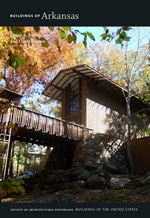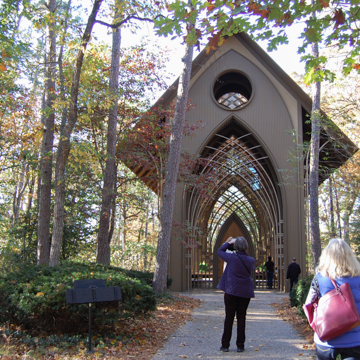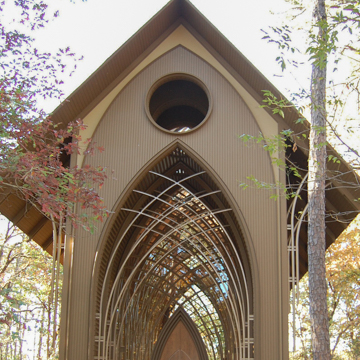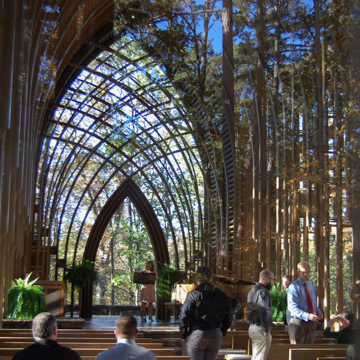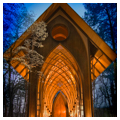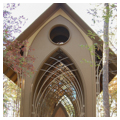This building, designed after the more famous Thorncrown Chapel (CR17), contributed further to Jones’s national reputation as a designer with a refined sensitivity to chapel design and his extraordinary skill in relating building to site. Named for the wife of a Bella Vista (see BN14) developer, Cooper Chapel stands on the brow of a wooded rounded ridge of the Ozark Mountains. The chapel, not visible from the landscaped entrance to the site, is approached by a paved footpath that curves among indigenous pines, oaks, and dogwoods, delaying for some distance a clear view of the building. The facade, centered on a pair of wooden doors surrounded by a patterned wall of glass, seems comfortably sheltered by the generous overhang of a steeply gabled roof. The door is framed by an expanding translucent grid formed by the slender arches which rise steeply to form a pointed arch, reminiscent of Gothic design. The wooden door seems to be a generator of the arch shape, moving outward and upward in a repeated expanding pattern. Above the door in the upper portion of the redwood gable is a circular window, which makes direct reference to Gothic rose windows. Inside, the slender rectangular nave is divided by a central aisle with flanking pews and sheltered under a web of intersecting steel arches. The use of steel allowed Jones to create a more delicate covering, and light filters to the interior from a ridgeline skylight through the network of structural members.
You are here
Mildred B. Cooper Memorial Chapel
If SAH Archipedia has been useful to you, please consider supporting it.
SAH Archipedia tells the story of the United States through its buildings, landscapes, and cities. This freely available resource empowers the public with authoritative knowledge that deepens their understanding and appreciation of the built environment. But the Society of Architectural Historians, which created SAH Archipedia with University of Virginia Press, needs your support to maintain the high-caliber research, writing, photography, cartography, editing, design, and programming that make SAH Archipedia a trusted online resource available to all who value the history of place, heritage tourism, and learning.





